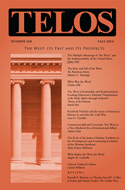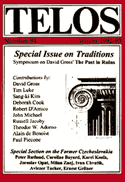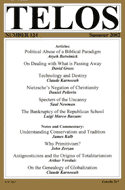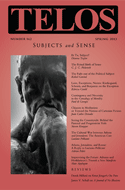By Russell A. Berman · Monday, September 15, 2014 Telos 168 (Fall 2014) is now available for purchase in our store.
 This special issue of Telos investigates the concept of the West. Far more than a geographical term, in intellectual, philosophical, and cultural history, it has been common to speak of a Western tradition in order to name lineages of thought from antiquity to the modern world. In cultural and political debates, Western values are invoked that are linked historically to a deep tradition specifically dedicated to desiderata such as freedom and individual dignity: at stake is the general possibility of any long-term tradition, the durability of culture over time, but also this very specific, distinctively Western tradition as the carrier of particular values. Politically this usage explains the reference to Western democracies (as opposed to the “peoples’ democracies” of the Soviet era) with the suggestion that democratic political forms and norms have emerged from the “Western tradition” and have generated the institutions of both liberal democracy, i.e., democratic procedures that assert popular sovereignty, while simultaneously protecting individual rights, and market economies shaped by the rule of law and the protection of private property. This special issue of Telos investigates the concept of the West. Far more than a geographical term, in intellectual, philosophical, and cultural history, it has been common to speak of a Western tradition in order to name lineages of thought from antiquity to the modern world. In cultural and political debates, Western values are invoked that are linked historically to a deep tradition specifically dedicated to desiderata such as freedom and individual dignity: at stake is the general possibility of any long-term tradition, the durability of culture over time, but also this very specific, distinctively Western tradition as the carrier of particular values. Politically this usage explains the reference to Western democracies (as opposed to the “peoples’ democracies” of the Soviet era) with the suggestion that democratic political forms and norms have emerged from the “Western tradition” and have generated the institutions of both liberal democracy, i.e., democratic procedures that assert popular sovereignty, while simultaneously protecting individual rights, and market economies shaped by the rule of law and the protection of private property.
Continue reading →
By Aaron Bell · Tuesday, May 20, 2014  It is hard to imagine what Adorno’s corpus would look like without the deep scars left by his period of exile in the United States during the Second World War. Despite its catastrophic genesis, his exile played a constitutive role in the development of his thought, and made him, among many other things, a savagely insightful commentator on American life. This commentary on America is marked by a dialectic of fascination and disgust with his newfound home, perhaps the most “radically bourgeois country” (75) in the Western world. In particular, he was fascinated by America’s lack of cultural tradition. In his essay “On Tradition,” America serves as a model of a society ravaged by bourgeois rationalization, proudly celebrating its lack of tradition by rejecting “old world” values as archaic, irrational, and pompous. The relatively short history of the nation compounds the problem, further disconnecting us from any substantial sense of tradition or historical consciousness. We are proudly the country of the nouveau riche, possessed of power and wealth bereft of tradition and culture. This literal lack of history and evaluative rejection of tradition places America at ground zero of the crisis of tradition. Tradition survives in America in its most degraded and mutilated forms, manufactured in artificially aged consumer products and conservative “traditional” family values. The recent wave of gauche typographical décor emblazoned with the actual word “TRADITION” seems designed to confirm Adorno’s worst accusations. It is hard to imagine what Adorno’s corpus would look like without the deep scars left by his period of exile in the United States during the Second World War. Despite its catastrophic genesis, his exile played a constitutive role in the development of his thought, and made him, among many other things, a savagely insightful commentator on American life. This commentary on America is marked by a dialectic of fascination and disgust with his newfound home, perhaps the most “radically bourgeois country” (75) in the Western world. In particular, he was fascinated by America’s lack of cultural tradition. In his essay “On Tradition,” America serves as a model of a society ravaged by bourgeois rationalization, proudly celebrating its lack of tradition by rejecting “old world” values as archaic, irrational, and pompous. The relatively short history of the nation compounds the problem, further disconnecting us from any substantial sense of tradition or historical consciousness. We are proudly the country of the nouveau riche, possessed of power and wealth bereft of tradition and culture. This literal lack of history and evaluative rejection of tradition places America at ground zero of the crisis of tradition. Tradition survives in America in its most degraded and mutilated forms, manufactured in artificially aged consumer products and conservative “traditional” family values. The recent wave of gauche typographical décor emblazoned with the actual word “TRADITION” seems designed to confirm Adorno’s worst accusations.
Continue reading →
By Maja Sidzinska · Thursday, October 17, 2013 As an occasional feature on TELOSscope, we highlight a past Telos article whose critical insights continue to illuminate our thinking and challenge our assumptions. Today, Maja Sidzinska looks at James Kalb’s “Understanding Conservatism and Tradition,” from Telos 124 (Summer 2002).
 Let’s start with the punch-line: James Kalb informs us, in his article “Understanding Conservatism and Tradition,” that “the modern emphasis is too much on technology, on breaking things down to their simplest parts and reconstructing them in accord with human will. The problem with applying that approach to human life as a whole is that one can make sense of one’s actions only by reference to standards and realities one does not create” (164). In Kalb’s view, tradition creates these standards and realities, and is irreplaceable in this role. He compares the role of tradition to the roles of bureaucracy and markets, and he holds these three operative approaches as constitutive of politics, public policy, and life more generally. Let’s start with the punch-line: James Kalb informs us, in his article “Understanding Conservatism and Tradition,” that “the modern emphasis is too much on technology, on breaking things down to their simplest parts and reconstructing them in accord with human will. The problem with applying that approach to human life as a whole is that one can make sense of one’s actions only by reference to standards and realities one does not create” (164). In Kalb’s view, tradition creates these standards and realities, and is irreplaceable in this role. He compares the role of tradition to the roles of bureaucracy and markets, and he holds these three operative approaches as constitutive of politics, public policy, and life more generally.
Continue reading →
By Russell A. Berman · Monday, March 18, 2013 Telos 162 (Spring 2013) is now available for purchase in our store.
 At its inception, Telos pursued a specific project as a journal: to serve as a bridge between the world of what was then often referred to as “European theory” and a U.S. intellectual world largely defined by quantitative methods in the social sciences. Over time, the terminology changed, and it is now more common to use the parlance of “analytic” and “continental” modes of philosophy, and if the latter term still clearly points toward Europe, there are representatives of both trends in the university lives on both sides of the Atlantic. In retrospect, however, the question for Telos was never one of a simple cultural transfer or the pursuit of some intellectual equilibrium in which scholars in both worlds would think the same way. On the contrary, instead of thinking about method in general, at stake for Telos was the difference between reflections on the meaning of the human condition, thoughtful explorations of the good life, and what appeared to be an exclusively numerical measuring of the status quo, a positivist description of what already exists, with no expectation of change. At its inception, Telos pursued a specific project as a journal: to serve as a bridge between the world of what was then often referred to as “European theory” and a U.S. intellectual world largely defined by quantitative methods in the social sciences. Over time, the terminology changed, and it is now more common to use the parlance of “analytic” and “continental” modes of philosophy, and if the latter term still clearly points toward Europe, there are representatives of both trends in the university lives on both sides of the Atlantic. In retrospect, however, the question for Telos was never one of a simple cultural transfer or the pursuit of some intellectual equilibrium in which scholars in both worlds would think the same way. On the contrary, instead of thinking about method in general, at stake for Telos was the difference between reflections on the meaning of the human condition, thoughtful explorations of the good life, and what appeared to be an exclusively numerical measuring of the status quo, a positivist description of what already exists, with no expectation of change.
Continue reading →
|
|
 This special issue of Telos investigates the concept of the West. Far more than a geographical term, in intellectual, philosophical, and cultural history, it has been common to speak of a Western tradition in order to name lineages of thought from antiquity to the modern world. In cultural and political debates, Western values are invoked that are linked historically to a deep tradition specifically dedicated to desiderata such as freedom and individual dignity: at stake is the general possibility of any long-term tradition, the durability of culture over time, but also this very specific, distinctively Western tradition as the carrier of particular values. Politically this usage explains the reference to Western democracies (as opposed to the “peoples’ democracies” of the Soviet era) with the suggestion that democratic political forms and norms have emerged from the “Western tradition” and have generated the institutions of both liberal democracy, i.e., democratic procedures that assert popular sovereignty, while simultaneously protecting individual rights, and market economies shaped by the rule of law and the protection of private property.
This special issue of Telos investigates the concept of the West. Far more than a geographical term, in intellectual, philosophical, and cultural history, it has been common to speak of a Western tradition in order to name lineages of thought from antiquity to the modern world. In cultural and political debates, Western values are invoked that are linked historically to a deep tradition specifically dedicated to desiderata such as freedom and individual dignity: at stake is the general possibility of any long-term tradition, the durability of culture over time, but also this very specific, distinctively Western tradition as the carrier of particular values. Politically this usage explains the reference to Western democracies (as opposed to the “peoples’ democracies” of the Soviet era) with the suggestion that democratic political forms and norms have emerged from the “Western tradition” and have generated the institutions of both liberal democracy, i.e., democratic procedures that assert popular sovereignty, while simultaneously protecting individual rights, and market economies shaped by the rule of law and the protection of private property.  It is hard to imagine what Adorno’s corpus would look like without the deep scars left by his period of exile in the United States during the Second World War. Despite its catastrophic genesis, his exile played a constitutive role in the development of his thought, and made him, among many other things, a savagely insightful commentator on American life. This commentary on America is marked by a dialectic of fascination and disgust with his newfound home, perhaps the most “radically bourgeois country” (75) in the Western world. In particular, he was fascinated by America’s lack of cultural tradition. In his essay “On Tradition,” America serves as a model of a society ravaged by bourgeois rationalization, proudly celebrating its lack of tradition by rejecting “old world” values as archaic, irrational, and pompous. The relatively short history of the nation compounds the problem, further disconnecting us from any substantial sense of tradition or historical consciousness. We are proudly the country of the nouveau riche, possessed of power and wealth bereft of tradition and culture. This literal lack of history and evaluative rejection of tradition places America at ground zero of the crisis of tradition. Tradition survives in America in its most degraded and mutilated forms, manufactured in artificially aged consumer products and conservative “traditional” family values. The recent wave of gauche typographical décor emblazoned with the actual word “TRADITION” seems designed to confirm Adorno’s worst accusations.
It is hard to imagine what Adorno’s corpus would look like without the deep scars left by his period of exile in the United States during the Second World War. Despite its catastrophic genesis, his exile played a constitutive role in the development of his thought, and made him, among many other things, a savagely insightful commentator on American life. This commentary on America is marked by a dialectic of fascination and disgust with his newfound home, perhaps the most “radically bourgeois country” (75) in the Western world. In particular, he was fascinated by America’s lack of cultural tradition. In his essay “On Tradition,” America serves as a model of a society ravaged by bourgeois rationalization, proudly celebrating its lack of tradition by rejecting “old world” values as archaic, irrational, and pompous. The relatively short history of the nation compounds the problem, further disconnecting us from any substantial sense of tradition or historical consciousness. We are proudly the country of the nouveau riche, possessed of power and wealth bereft of tradition and culture. This literal lack of history and evaluative rejection of tradition places America at ground zero of the crisis of tradition. Tradition survives in America in its most degraded and mutilated forms, manufactured in artificially aged consumer products and conservative “traditional” family values. The recent wave of gauche typographical décor emblazoned with the actual word “TRADITION” seems designed to confirm Adorno’s worst accusations.  Let’s start with the punch-line: James Kalb informs us, in his article “Understanding Conservatism and Tradition,” that “the modern emphasis is too much on technology, on breaking things down to their simplest parts and reconstructing them in accord with human will. The problem with applying that approach to human life as a whole is that one can make sense of one’s actions only by reference to standards and realities one does not create” (164). In Kalb’s view, tradition creates these standards and realities, and is irreplaceable in this role. He compares the role of tradition to the roles of bureaucracy and markets, and he holds these three operative approaches as constitutive of politics, public policy, and life more generally.
Let’s start with the punch-line: James Kalb informs us, in his article “Understanding Conservatism and Tradition,” that “the modern emphasis is too much on technology, on breaking things down to their simplest parts and reconstructing them in accord with human will. The problem with applying that approach to human life as a whole is that one can make sense of one’s actions only by reference to standards and realities one does not create” (164). In Kalb’s view, tradition creates these standards and realities, and is irreplaceable in this role. He compares the role of tradition to the roles of bureaucracy and markets, and he holds these three operative approaches as constitutive of politics, public policy, and life more generally.  At its inception, Telos pursued a specific project as a journal: to serve as a bridge between the world of what was then often referred to as “European theory” and a U.S. intellectual world largely defined by quantitative methods in the social sciences. Over time, the terminology changed, and it is now more common to use the parlance of “analytic” and “continental” modes of philosophy, and if the latter term still clearly points toward Europe, there are representatives of both trends in the university lives on both sides of the Atlantic. In retrospect, however, the question for Telos was never one of a simple cultural transfer or the pursuit of some intellectual equilibrium in which scholars in both worlds would think the same way. On the contrary, instead of thinking about method in general, at stake for Telos was the difference between reflections on the meaning of the human condition, thoughtful explorations of the good life, and what appeared to be an exclusively numerical measuring of the status quo, a positivist description of what already exists, with no expectation of change.
At its inception, Telos pursued a specific project as a journal: to serve as a bridge between the world of what was then often referred to as “European theory” and a U.S. intellectual world largely defined by quantitative methods in the social sciences. Over time, the terminology changed, and it is now more common to use the parlance of “analytic” and “continental” modes of philosophy, and if the latter term still clearly points toward Europe, there are representatives of both trends in the university lives on both sides of the Atlantic. In retrospect, however, the question for Telos was never one of a simple cultural transfer or the pursuit of some intellectual equilibrium in which scholars in both worlds would think the same way. On the contrary, instead of thinking about method in general, at stake for Telos was the difference between reflections on the meaning of the human condition, thoughtful explorations of the good life, and what appeared to be an exclusively numerical measuring of the status quo, a positivist description of what already exists, with no expectation of change. 






